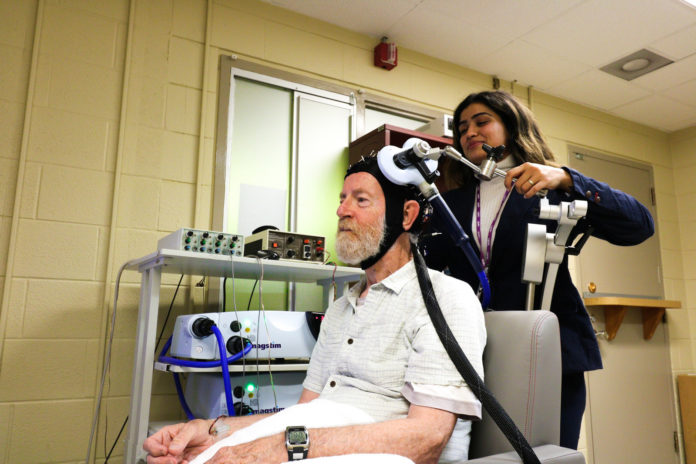Declines in plasticity – the brain’s ability to adapt – may underlie memory problems
In an innovative study, researchers at the Centre for Addiction and Mental Health (CAMH) have discovered brain changes linked to memory loss in people with Alzheimer’s disease. The discovery provides a new focus for exploring ways to treat or prevent dementia, which currently affects more than 560,000 Canadians.
Published in JAMA Psychiatry, the study shows that the brain’s ability to adapt or change – called brain plasticity – is significantly lower in people with early Alzheimer’s disease than in healthy individuals of the same age. The research focuses on plasticity in the frontal lobes, the brain region involved in higher thinking activities, such as planning and working memory. Working memory is the type of memory used to store and manipulate information to complete tasks over a short time period, such as doing mental calculations. The findings also reveal that people with reduced plasticity in the frontal lobes also experienced poorer working memory.
“What’s exciting is that we clearly demonstrated impairments in brain plasticity in the frontal lobes in people with early Alzheimer’s disease, and we showed that impaired brain plasticity is related to impaired function of the frontal lobes, specifically working memory,” says Dr. Tarek Rajji, senior author of the study and Chief of the Adult Neurodevelopment and Geriatric Psychiatry Division at CAMH. “This may indicate that impairments in brain plasticity underlie impairments in memory.”
The findings are promising because “impaired brain plasticity may be a future target for treatment or prevention of dementia, for which no great treatments exist at present,” says Dr. Sanjeev Kumar, lead author of the study and Medical Head of Geriatric Mental Health Inpatient Services at CAMH. Dr. Kumar and Dr. Rajji are both Clinician Scientists in CAMH’s Campbell Family Mental Health Research Institute.
Healthy plasticity in the frontal lobes is important because researchers believe this brain region supports the brain’s “cognitive reserve,” or protection, that offsets poorer functioning in other brain areas that may contribute to the development of dementia. “Individuals with a higher reserve have been shown to develop dementia later in life than those with a lower reserve,” says Dr. Kumar.
The research team used an innovative approach, developed by Dr. Rajji and his colleagues in earlier research, to study brain plasticity in the frontal lobes.
In the CAMH-developed approach, the researchers use scalp electroencephalography (EEG), which measures electrical output generated directly by the frontal lobes in response to two-pronged brain stimulation, referred to as paired associative stimulation (PAS). The participant wears a 64-node cap that transmits the EEG signal, and researchers measure a person’s EEG signal before and after stimulation. Changes in this signal are an indicator of brain plasticity in the frontal lobes.
The study included 32 people with Alzheimer’s disease and 16 healthy individuals, aged 65 or older. “In both healthy individuals and people with early Alzheimer’s disease, we were able to illicit a plasticity response from the frontal lobes, which is positive in that it shows that the brain circuits are still working in people with early Alzheimer’s disease,” says Dr. Kumar. “But plasticity was significantly lower in people with Alzheimer’s disease.”
Prior to the PAS arm of the study, each participant completed a memory test to assess the ability to recall alphabetic letter sequences. Individuals with impaired plasticity also had poorer recall ability.
As next steps, the researchers are investigating approaches to enhance plasticity in the frontal lobes. This includes research on brain stimulation alone or combined with brain-training exercises. Says Dr. Rajji, “Our goals now are: In people with early Alzheimer’s disease, can we recover plasticity in the frontal lobes, and will this lead to an improvement in memory? And, can we take this one step earlier – in people at risk of developing Alzheimer’s disease, can we enhance plasticity to prevent the progression toward illness?”
The study was mainly supported by a grant from the Weston Brain Institute, and in part by the Canada Research Chairs program, the Canada Foundation for Innovation, a CAMH fellowship award and in-kind support from CAMH’s Temerty Centre for Therapeutic Brain Intervention.




